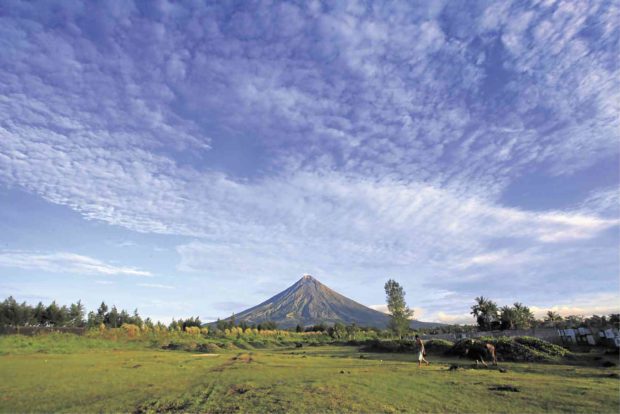
MARK ALVIC ESPLANA
LIGAO CITY—Tourists seeking to relish another experience in Albay province can see something exciting under the shadow of majestic Mt. Mayon—beaches in Ligao City and Oas town.
One-and-a-half-hour’s drive from the city center and along the well-maintained Ligao-Pio Duran national road and the Albay west coast road lies a marine reserve in Sitio (subvillage) Tambak, Maonon village.
Maonon is known for a rocky islet, “Batong Langoyon,” where tourists can snorkel among schools of fish through rich coral reefs beneath the waves. It can be reached by motorized boat in 20 minutes.
“We consider the place a marine reserve and protected area. Blast fishing and all illegal forms of fishing have been stopped several years ago,” said Bob Porcalla, a diver at the city government.
The Legazpi Boulevard in Legazpi City is a favorite spot of locals and visitors alike.
Efforts by a vigilant “Bantay Dagat” (sea patrol) have allowed different fish species to thrive, such as sharks, “talakitok” (trevally or kingfish), “pawikan” (sea turtles), barracuda and even giant clams.
Visitors can also take a tour through a 50-hectare mangrove plantation closely monitored by village officials.
Religious trek
In Oas, a 5-kilometer stretch of fine white sand beach awaits in Sitio Imacoto, Barangay Cagmanaba. On several islets, caves beckon to visitors.
Newly caught fish are sold cheap by fisherfolks along the beach.
A visit to the third congressional district of Albay will not be complete without climbing Kawa-Kawa Hill in Ligao’s Barangay Tuburan. Described as “the hill without a hilltop” for its cauldron shape, the place offers a breathtaking view of the city and even Lake Bato in neighboring Camarines Sur province.
Life-size images depicting the Passion of the Christ attract pilgrims and the faithful to pray in Kawa-Kawa, especially during Lent.
From the city, one can ride a jeepney or drive to Jovellar town to explore the 120-meter underground river in Quitinday village. There are several springs and waterfalls near picnic areas.
A trek through Quitinday Hills in Camalig town rewards visitors with a view of majestic Mayon
A 30-minute drive further to Camalig town is St. John the Baptist Church, recently declared an important cultural property by the National Museum of the Philippines. It is the oldest structure in town, built and managed by the Franciscan missionaries for over 400 years, according to its marker.
The church served as refuge for residents during World War II and when the Americans came to help drive away the Japanese occupation forces, according to Jed Villanueva, municipal tourism officer.
Stores along the national highway in the town center sell the famous local dish “pinangat.”
All-terrain vehicles give tourists a close encounter with the volcano. —PHOTOS BY MARK ALVIC ESPLANA
Volcano tour
After an overnight stay at hotels in the capital city of Legazpi, tourists can get up close and personal with Mayon Volcano.
Cagsawa Ruins, with its iconic belfry, in Barangay Busya in Daraga town is 15 minutes by jeepney or rented tricycle. The belfry is the only structure left after Mayon erupted on Feb. 1, 1814, killing thousands of people.
Tourists can have fun doing camera tricks while taking souvenir pictures of the belfry and Mayon in the distance.
An ATV (all-terrain vehicle) ride can be rented from P699 for 45 minutes to an hour or P2,500 for two to three hours, depending on the trail distance, to reach the lava wall at the foot of the volcano.
Harry Esquivel, an ATV operator, says the ride is perfect for thrill seekers.
“Along the way, the rider will traverse rivers and encounter boulders that came rolling down from Mayon’s crater during the previous eruption,” Esquivel says.
After the ride, tourists can have a glimpse of Daraga town and the sea off Legazpi from the Church of the Nuestra Señora de la Porteria (Our Lady of the Gate), more commonly known as Daraga Church, on a hilltop.
The church’s baroque architecture and facade, mostly made of volcanic stones, was declared a national treasure on Oct. 29, 2007 by the National Historical Commission of the Philippines.
The pristine beaches of Albay’s west coast, like the waters of Maonon in Ligao City, are among the less explored destinations in the province.
Food trip
A grumbling stomach in Albay should be filled with authentic and savory Bicol cuisine and dishes. One should not miss taking a bite or more of the “Bicol Express,” the Mayon-stuffed pizza, native “tinutongang manok” and other seafood dishes.
One can also try the spicy “sili” ice cream offered by branches of a homegrown restaurant in shopping malls in Legazpi.